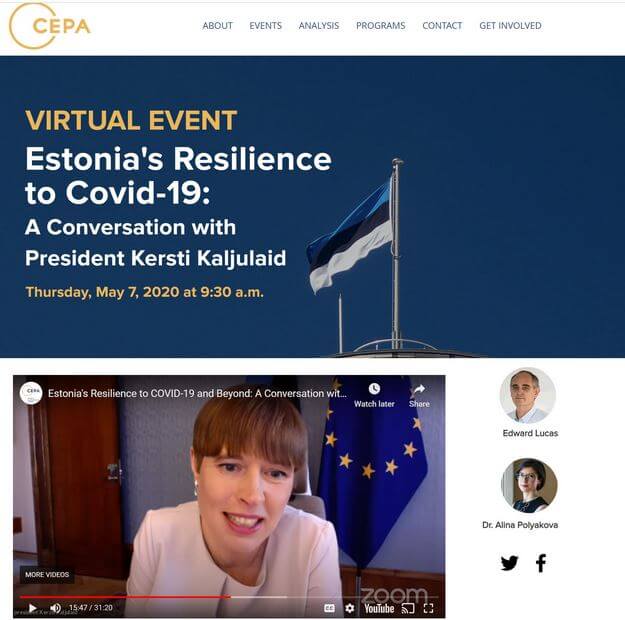
President Kaljulaid discussing Estonian coronavirus policy at CEPA. Photo source: cepa.org
Recent virtual events have highlighted Estonia’s approach to dealing with the coronavirus pandemic and how Estonia, Latvia and Lithuania plan to implement policy as the world shifts to its new normal. President Kersti Kaljulaid was featured in two events that focused on Estonia’s resilience, along with its use of cyber expertise and its current United Nations Security Council (UNSC) seat to raise cyber awareness and offer unique solutions to challenges posed by the global crisis. Two other events featured Estonian experts discussing cyber threats that are capitalizing on the ripe environment for disinformation and the pandemic’s implications for democracy and governance moving forward.
The Center for European Policy Analysis (CEPA) held a conversation with President Kaljulaid on May 7th that delved into how Estonia’s established system of e-governance and high level of trust between the government and public facilitated their rapid response to the virus. She cited their e-health system as the most important digital innovation in keeping the population safe. When the conversation turned to Estonia’s security, President Kaljulaid noted that although some military exercises had to be cancelled or postponed, she received affirmation from NATO Secretary General Stoltenberg and other allies that, “we will if necessary fight, even with the virus.” Estonia’s capabilities in combating disinformation and protecting critical infrastructure and public services, and its current leadership roles in the UNSC and the Three Seas initiative, were also discussed.
At the event’s 16-minute point, EANC asked a question about disinformation campaigns by the Kremlin and China related to COVID-19, which prompted praise for our work from CEPA moderator Edward Lucas. The President went on to answer that until there is a place globally where victims of disinformation or cyberattacks can complain, there is no point in bothering with attribution. She hopes “that through our adventures on the Security Council we’ll manage to change this…The only way out of this situation in fact, is taking anonymity out of the internet.” She placed responsibility on governments to give their citizens secure identities on the internet. The full 30-minute video is available at cepa.org/past-events.
President Kaljulaid was also hosted by the Carnegie Endowment for International Peace (CEIP) on May 26th for a conversation with New York Times national security correspondent David Sanger on Cyberspace in Times of Corona. This discussion centered around Estonia’s bringing cybersecurity and cyber issues to the UNSC agenda for the first time, as well as raising awareness of the digital tools that governments can use to provide services to their people in a secure online environment.

Baltic Bubble on post-COVID-19 governance panelists. Photo source: lithuanianleaders.org
The potential for the U.S. to adopt online voting was among the topics discussed. The President made it clear that doing so is possible, but it takes a process that can’t happen overnight. In Estonia’s case, low-risk services were introduced first, with e-voting as the eventual ultimate goal. Building public trust is the most important part of the process and in Estonia’s case, gradual introduction of new services according to their security and reliability at every level was necessary before its citizens had confidence in the government to safely conduct e-voting. She also noted that e-governance is safe only in democratic systems; voting – digital or analog – isn’t safe under authoritarian rule. The full 60-minute event can be viewed at carnegieendowment.org under previous events.
CEPA also featured Merle Maigre, Executive Vice President for Government Relations, CybExer Technologies, Estonia in a panel discussion on “The Transatlantic Response to Cyber Threats Amid COVID-19” on May 1st. She and colleagues from Lithuania and the Atlantic Council discussed whether the U.S. and Europe are at greater risk of disinformation and cyberattacks because of COVID-19 and ways to improve resilience to attacks. This discussion is also available under CEPA’s past events.
Finally, an event organized through a joint task force “LTiVote” between GLL Think & Do Tank and the Economic Cooperation Commission of the Lithuanian World Community addressed “The Baltic Digital Bubble: Post Covid-19 Governance and Voting”. The Estonian representative was Arne Koitmäe, Deputy Head of the State Electoral Office of Estonia. Latvia was represented by Ieva Ilves, Advisor to the President of Latvia on Information and Digital Policy, and the Lithuanian expert was Laura Matjošaitytė, Chairwoman of the Central Electoral Commission of the Republic of Lithuania. The main topic of this panel was safe voting amid the pandemic. Maintaining election security is vital to all three nations and using Estonia’s model of e-voting could be a solution if Latvia and Lithuania can build the public trust necessary to implement the program.
Mr. Koitmäe provided some statistics and background on Estonia’s system. Internet voting in Estonia started in 2005, three years after the government started planning for it. It is the most popular method of voting in Estonia, with 40% of the population using it. E-voting hasn’t significantly increased participation in elections, but it does keep voters engaged and has increased voting rates among Estonians living overseas and disabled voters.
There is no evidence of political bias among citizens who use the system; their decisions are evidently still based on the issues that are important to them.
The system is auditable and observable but is not 100% secure, as no system can be. Trust in the system is high, but there is always opposition, so controversy remains.
Key safety points include protecting the privacy of the votes, ensuring they are not tampered with, and ensuring they are not coerced. Whether e-voting and other digital tools will impact the future of democracy will depend on successful development and introduction of the tools by national governments.
Karin Shuey
Washington, DC Director
Estonian American National Council
www.estosite.org













